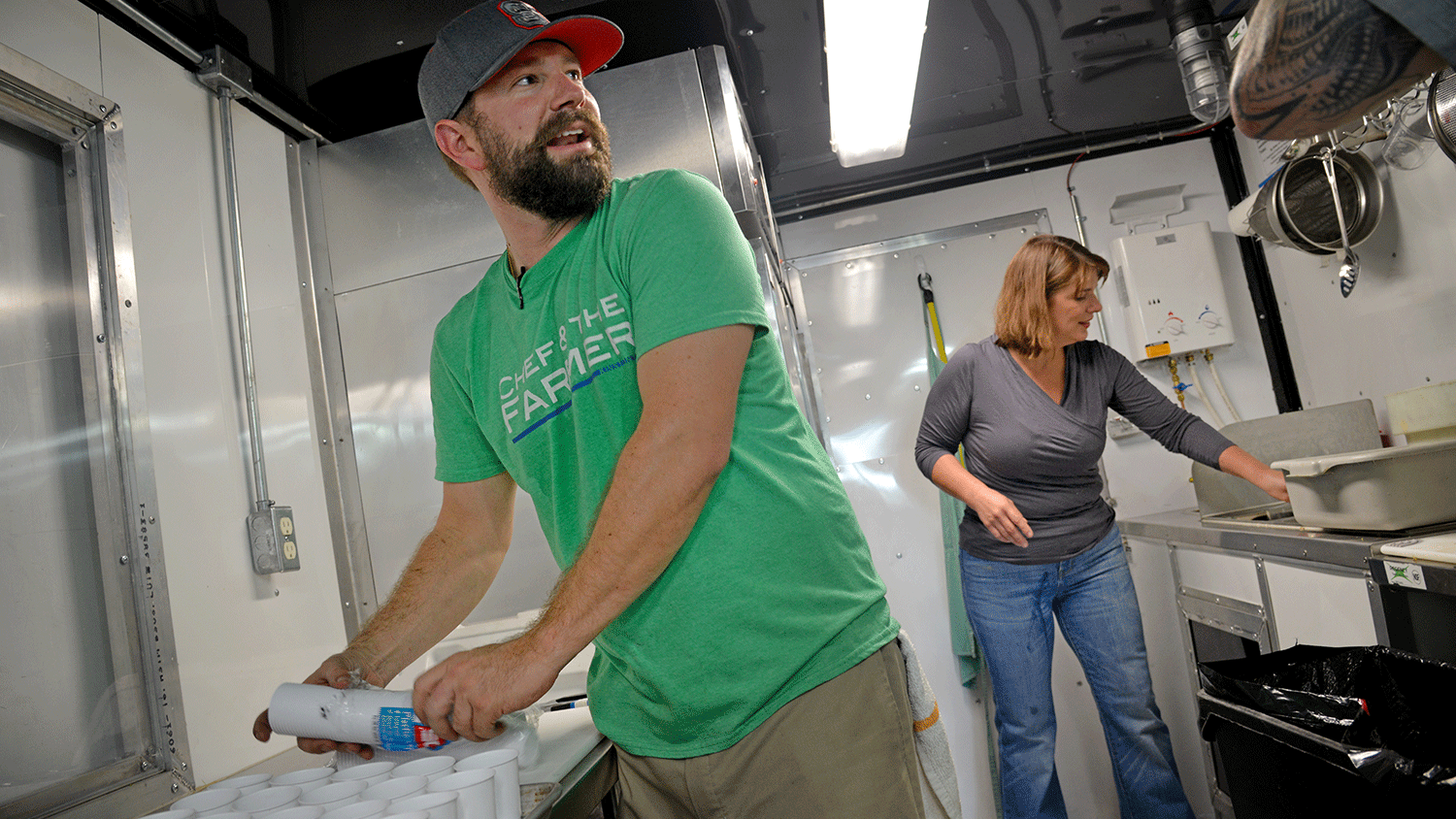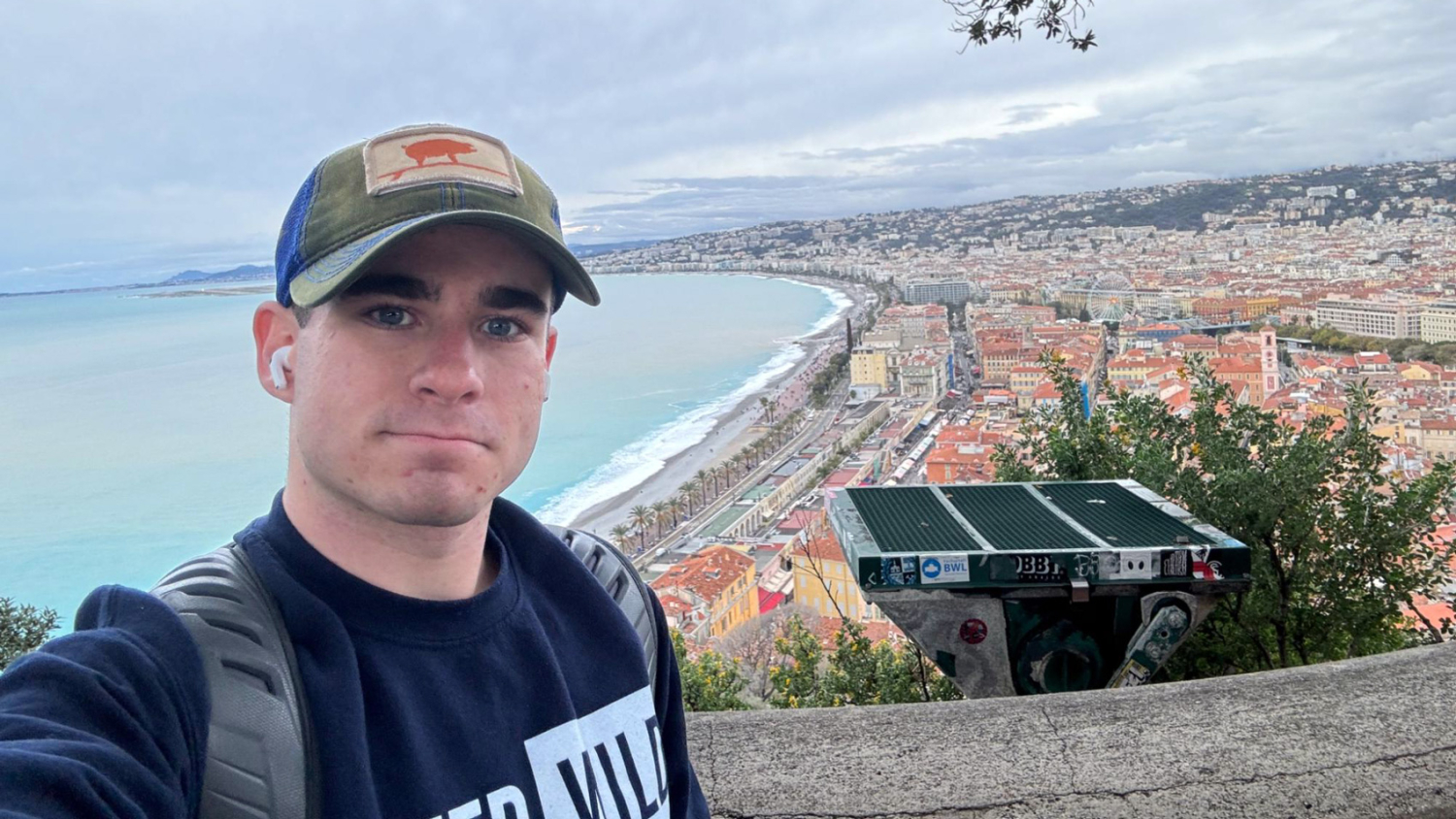Poole Graduate Trades in Briefcase for a Knife Roll, Food Truck

What started as somewhat of a wild hair to leave his career in banking and cook in a restaurant has led NC State Poole College graduate Casey Atwater (bachelor of science, 2000) to working with a renowned chef. He now is honing not only his cooking but also his management skills at the Kinston, N.C. restaurant, Chef and the Farmer. Atwater tells his story in an email interview with Poole College communications.
Vivian Howard, also an NC State graduate, from the College of Humanities and Social Sciences, started Chef and the Farmer with Ben Knight, in Kinston, N.C., in 2006. Their goal was to help some of North Carolina’s displaced tobacco farmers to become food farmers. Sourcing their ingredients locally and preparing meals based on the region’s traditional foods have led to a strong following among those who enjoy good food.
Howard tells the story of the restaurant along with some history and recipes in her book, Deep Run Roots, noting on her website that she “started working in restaurant kitchens because I wanted to turn that experience into a career in food writing.”
Her first book and subsequent book tour this fall provided Atwater an unlikely role for a finance major: director of culinary operations. That’s the title on his business card these days, but “Chef de Food Truck is the title that seems to have stuck and that I am most proud of,” he said.
Road Trip
Atwater, Howard, and their crew left Kinston on October 4, 2016, with Atwater at the helm of the food truck. They had nearly 30 truck stop events on their seven-state journey, including one in Washington, D.C.
The road trip is Atwater’s second stint with Howard and her related entities. He originally joined the team in June 2015, when he responded to a social media ad posted by Chef and the Farmer, seeking employees that would live in Kinston, work six months on their kitchen line, and also work on the farm.
“I felt I had enough natural ability to give it a try, so I emailed them and they had me come in for a ‘stage,’ which is what they call an interview in the food industry,” he said.
Atwater went to Kinston a few weeks later. “My first night there I did prep for the first part of the day and then much to my surprise they put me on the line that night. It is an open kitchen line for all the restaurant to see so you can imagine my angst!” One of the kitchen team provided training on the wood oven and “within an hour or so I was running it on my own. John May, who was sous chef at the time, pulled me aside and said for an ‘old banker’ I had held my own and that they would probably hire me. One week later, I was moving to Kinston to start my stint in the food world.”
Atwater said he had eaten at Chef and the Farmer before joining the kitchen team, and he “admired both Vivian’s ability to create delicious food and a top notch dining experience, as well as the skill and ability of the line. For me, being on the other side of the counter was like an armchair quarterback getting to suit up and walk out onto the field on Sunday afternoon.”
In the Field
In addition to cooking, Atwater worked on the farm most Fridays when he was in Kinston. “It was a nice break from the Kitchen but challenging in its own right. I worked with Warren Brothers, Lillie Hardy and very much enjoyed my time getting my hands dirty in the rich soil of Lenoir County.”
He also enjoyed working on the line in the kitchen. “It is intense, stressful, physical work but it was such a vast departure from what I had been doing that I couldn’t help but enjoy every piece of it. I felt like I was not only learning and sharpening my skills as a cook, but I was doing it in one of the best restaurants in the country, under the watch of one of the best chefs in the country,” he said.
“I felt lucky. It was truly an experience I will never replicate. Friends and family would travel to eat and come see me and it was so validating, so flattering. People cared what I was doing, albeit in many ways just a simple thing.”
In the Kitchen
Atwater said he had to adapt his home cooking style to the restaurant setting. “The first thing that comes to mind is quantity. The amount of stuff you have to make and prep is mind boggling compared to how you cook at home. If you think you need two quarts of basil pesto, you better go ahead and make four,” he said.
Consistency was also essential. “You are responsible for making several dishes the same way, night after night. You also have to be able to follow a recipe, and instructions. As a home cook I took great pride in being able to cook without following a recipe and just being able to put together good dishes without following any specific instruction. I had to quickly let go of ‘my way’ of wanting to do things but I was fine to do that. I knew I was there to execute her food, not my own,” he said.
As much as he enjoyed the experience, Atwater said that he knew before he became a cook at the restaurant that he would only stay about six months. That was “about the amount of time I was willing to commit to ‘exploring’ something else.” Also, he said, “I am past my prime for that type of work. It is a young man’s game. I was good at it, but I felt it. And … the hours are not conducive to the type of life I want to lead. As much as I loved being a restaurant cook, I also love being a restaurant patron. Chef always says, ‘we are working when everybody else is playing.’ I like playing too much.”
He left the Chef’s kitchen on January 9, 2016, heading back to Raleigh. He stayed in touch with Howard and “came back to Kinston multiple times to help her prep for special events and even traveled with her some to help with dinners,” he stated. “I was glad to still be relevant and a part of the team.”
Then, in May, she had offered him a new role: culinary assistant. After some negotiating, “we got together and I agreed to come back to work for her full time. My title is now director of culinary operations, but ‘Chef de Food Truck’ is the title that seems to have stuck and that I am most proud of. We left Kinston on October 4 with me at the helm of the food truck and we have gone non-stop ever since,” Atwater said.
His duties are varied: prepping, traveling, cooking for events, but mostly planning and logistics for the food truck book tour. “So far, we have been able to make all the logistics work,” he said, traveling with a small team that manages the serving window, cooking and other operations.
Making Connections
While on the road, Atwater said, “We are trying to do everything in the spirit of farm-to-table as much as we can. It is a little more challenging since we are in a different city every day and have not forged the alliances we have back home. However, we do prep some stuff at Chef and the Farmer and our pilot car brings it to us when it makes sense. Outside of that, we have partnered with Whole Foods and Lowe’s foods for a lot of our shopping; they both try to source their products locally in their respective markets,” he said.
“We are also very proud of our sponsorship relationships with Duke’s Mayonnaise, Applegate, Heritage Farms Cheshire Pork, Visit NC, and UNOX,” he said. One of the most challenging things they’ve have experienced is trying to cook when the truck is on an incline. “Gravity is not your friend on a food truck; bungee cords are,” he said.
Atwater isn’t applying much of his finance background in his role as ‘Chef de Food Truck,” but he has been using other skills sharpened while a student at Poole College, especially writing.
“I wrote the proposals that we submitted to the sponsors that I mentioned, that helped us solidify those relationships. Outside of that, I’m proud to be a sounding board for other business and financial questions that come up as we do our jobs day to day.” The demands of his ‘food’ role doesn’t leave time for him to manage much else sufficiently.
Atwater offers a few key take-away from his experience. “I have become more resourceful, more resilient and more driven to succeed than I have ever been before. There is no quitting, no giving up, and ‘no, I can’t’ is never acceptable. Every day, we plan, push, execute and succeed. We are a team. We have become more cohesive as we have moved throughout the country on a crazy food truck tour and I am so proud to be a part of it,” he said.
Key Takeaways
“There is no corporate organization giving us templates and telling us what to do. We figure it out. We create it. We learn and adapt. This, in my opinion, is something you don’t learn from a book; you learn it as you experience it. So, if I am to say to a student that is about to graduate from college, ‘this is what you should do next,’ it would be to go out and have experiences.
“Yes, you need a job, you need to make money, and you need to be a productive member of society. But don’t let the rationality of needing to do those things make you turn a blind eye to other experiences. Keep an open mind. Do things you enjoy and have a passion for. If you pursue them in earnest and work hard, the other things will come. You will find a way to make money. People will recognize your passion and want to work with you,” he said.
“Take all of the things you have learned while at NC State and channel them towards something you want to do. I have no regrets about spending 15 years in banking, but I have no regrets for having left, either.”
Atwater also gives kudos to his boss. “Vivian is an incredibly driven and talented person and that goes well beyond the kitchen. She is smart, innovative, and always thinking of the next way to show people what ENC (Eastern North Carolina) has to offer and why it is relevant,” he said.
“She works extremely hard, every day. Even though she does indeed have adoring fans, she has remained humble and I have never seen her not give herself to somebody that wants to share a moment with her. She understands what it does for people and she is responsible with that.”
Atwater added, “She drives us hard in the kitchen and on the road but we all eagerly rise to the occasion. You know where you stand with her. You do your very best to please her and help her move her vision forward because you want to, not because you have to. She is grateful.
“I can’t count how many times she has stopped me at the end of the day and thanked me very sincerely for the work that I am doing and that our team does. That to me is better than any paycheck, any dish, any cool new city that we pull in to. I am grateful for every part of this experience, I am a better person for it, and I hope others are too.”
- Categories:


